Drug & Alcohol Rehab Dorset & Near Dorset
Quick links for drug and alcohol rehab in Dorset and near Dorset
- Why should I seek drug and alcohol rehab in Dorset?
- How do I know if I need drug and alcohol rehab in Dorset?
- Which addictions are treated at drug and alcohol rehab in Dorset?
- What is the difference between drug rehab and alcohol rehab in Dorset?
- What is inpatient drug and alcohol rehab in Dorset?
- What is outpatient drug and alcohol rehab in Dorset?
- What are some alternatives to drug and alcohol rehab in Dorset?
- How do I organise a professional intervention for drug and alcohol rehab in Dorset?
- How much does drug and alcohol rehab in Dorset cost?
At Rehab Recovery, we aim to empower individuals in Dorset who struggle with drug and alcohol addiction.
We achieve this aim by offering an entirely free helpline for all your rehab queries.
When you contact Rehab Recovery, we carry out a short but important assessment so we may determine the best way forward for you.
Specifically, we determine the precise nature of your problems that relate to drug and alcohol addiction and potential rehab.
We then match you with a rehab provider in Dorset, near Dorset or surrounding areas that we believe are best suited to helping you resolve your problems with drug and alcohol addiction.
Whether you’re struggling with excessive drinking [1], drug use or even a behavioural addiction like gambling, our rehab experts are here to help.
To begin your recovery journey at a drug and alcohol rehab Dorset, call our expert team today on 0800 088 66 86
Why should I seek drug and alcohol rehab Dorset?
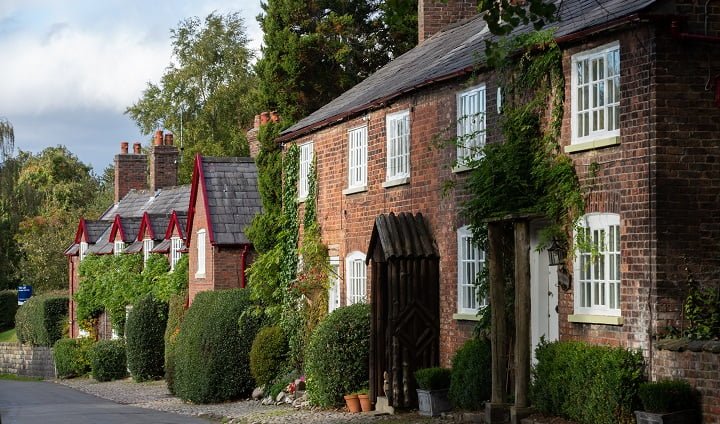
Outside photo of a drug and alcohol rehab centre in Dorset
In a large number of cases, addiction is a symptom of other underlying mental health conditions that are often undiagnosed. When they are discovered, this condition at rehab is called a dual diagnosis.
Conditions such as depression, schizophrenia, anxiety, bipolar disorder, Borderline Personality Disorder or Anti-Social Personality Disorder [30] often accompany addiction -particularly in the case of certain drugs and alcohol [31] – and make it much more difficult to treat without professional rehab help.
When these underlying conditions are treated at rehab alongside addiction, your chances of obtaining sobriety are heightened while also reducing your chances of relapsing in the future.
You can also get free mental health support from organisations like Mind UK, Young Minds, Rethink Mental Illness, Samaritans and Papyrus.
Within drug and alcohol rehab facilities in Dorset, the staff understand that addiction is an illness that needs to be treated as any other illness would.
You are not judged or seen as a failure because the team of professionals within rehab facilities understand that addiction changes the chemistry of the brain.
With this in mind, rehab facilities focus on abstinence rather than harm reduction or moderation management [32].
This is because rehab focuses on the disease model of addiction, meaning that addiction is seen as an illness that a person will always suffer from, even after years of sobriety.
Once you have suffered from an addiction, you are at a greater risk of relapsing. Abstaining from the substance entirely is the safest way to ensure that you are not tempted to indulge and risk falling back into the grips of addiction after rehab.
You can read more about the disease of addiction here before entering rehab [33].
At rehab in Dorset, you will undergo a psychiatric assessment to make sure that you receive the correct psychiatric treatment [34] for the problems that you have. This will be done by a medical professional such as a psychiatrist.
To learn how your addiction can be beaten at a drug and alcohol rehab in Dorset, call us on 0800 088 66 86
How do I know if I need drug and alcohol rehab Dorset?

Two people holding hands at a drug and alcohol rehab centre in Dorset
A good sign that you need rehab in Dorset is that you are struggling with addiction and you can’t seem to get a hold of your addictive behaviours [35].
Even if addiction is something new for you, rehab is still a good option, as it can help you to manage your problem before it gets worse.
Some people avoid rehab as their addiction is behavioural, and they believe they should be able to recover from it alone.
This is a huge mistake to make, as the consequences of behavioural addictions are often just as dangerous as substance addictions [36].
Get the help you need at a drug and alcohol rehab in Dorset by calling us on 0800 088 66 86
Which addictions are treated at drug and alcohol rehab in Dorset?

Staff member typing on a laptop at a drug and alcohol rehab centre in Dorset
All addictions can be treated at the right drug and alcohol rehab in Dorset.
However, there are also specialist rehabs that only treat certain addictions, so you could possibly attend a rehab treatment centre that is designed to manage your particular addiction.
Some examples of addictions that are often seen at rehab in Dorset [37] include:
- Prescription drug addiction
- Cannabis addiction
- Alcohol addiction
- Heroin addiction
- Cocaine addiction
- Porn addiction
- Compulsive eating
- Shopping addiction
- Gambling addiction
Whatever the nature of your addiction, get the help you need to overcome it from a drug and alcohol rehab in Dorset by reaching out to us on 0800 088 66 86
What is the difference between drug rehab and alcohol rehab in Dorset or near Dorset?

Man and woman talking at a drug and alcohol rehab centre in Dorset
As we have explained, there are some rehabs that treat specific addictions. This means someone with alcoholism could attend alcohol rehab in Dorset rather than drug rehab.
However, they would be just as welcome at a drug rehab.
In terms of treatment style and philosophy, the difference between drug and alcohol rehab is negligible.
Both aim to lower the risk of relapse in each rehab patient’s life by advocating for total abstinence, and both offer detoxing and therapy as a means to do this.
The detox process looks different depending on the drug involved, so detoxing at alcohol rehab is not exactly the same as it is at drug rehab. To give an example, medication is almost always used, whereas some drug detoxes are medication-free.
That said, as no drug is the same, there is also a huge variety of detoxes in drug rehab in Dorset.
It is not simply drug rehab vs. alcohol rehab – there are many unique aspects of each person’s specific treatment plan, whichever rehab facility they go to.
Find the best drug and alcohol rehab in Dorset for your needs by calling our team on 0800 088 66 86
What is the difference between private and council-funded addiction treatment in Dorset?

Exterior photo of a drug and alcohol rehab in Dorset
You would be forgiven for believing that private residential rehab is reserved for the rich and famous and is mostly unattainable for the average person.
For this reason, many people go straight to the NHS for treatment instead of exploring the private rehab options available in their area.
However, private rehab facilities are more affordable than you’d think, and many offer payment plans so anyone can avail of the treatment they provide.
Suppose you are considering drug and alcohol rehab in Dorset. In that case, it is important to look into both private and council-funded options, so you are equipped with all of the information needed to make an informed decision.
The benefits of private rehab in Dorset
- Immediate admission means that your rehab treatment in Dorset can begin straight away
- Treatments and addiction counselling tailored to your individual needs
- 24/7 access to medical professionals
- Safe and comfortable environment
- Comprehensive treatment program including dual diagnosis and uncovering the root cause of your addiction
- Learning relapse prevention strategies for after rehab in Dorset has ended
- Learning to identify your triggers and using coping strategies to overcome them
- High rates of success
- Dedicated aftercare teams
The cons of private rehab in Dorset
- High rehab costs can make it out of reach for many people in Dorset, even with payment plans available.
The benefits of council-funded rehab in Dorset
- Free of charge
- Available to anyone
- Available throughout Dorset
- There is normally no need to stay away from home
- Confidential
The cons of council-funded rehab in Dorset
- Long waiting times [38] for council-funded rehab admission mean that your alcohol or drug addiction could be worsening while you are waiting for treatment
- Only the addiction is treated, meaning underlying conditions are often not diagnosed or treated
- Greater risk of relapse
- You will likely see different therapists each time, making it difficult to build a rapport with a therapist you trust
- You will not have immediate access to addiction specialists should you need one.
Many free and NHS-run recovery services operate throughout Dorset, [39] some of which include:
1. Reach Dorset
Address: Community Learning And Resources Centre (CLARC) 41-44 King Street, Wimborne, BH21 1EB
Telephone: 0800 043 4656
Website: https://www.edp.org.uk/
2. CAMHS Dorset
Address: Seastone House, 49 Alumhurst Road, Westbourne, Bournemouth, BH4 8EP
Telephone: 0300 0191 770
Website: https://camhsdorset.org/
3. Dorset Mental Health Forum, near Dorset
Address: Dorset Mental Health Forum, 29-29A Durngate Street, Dorchester, DT1 1JP
Telephone: 01305 257 172
Website: https://www.dorsetmentalhealthforum.org.uk/
You can also reach out to organisations such as the NHS Foundation Trust, Change Grow Live and Alateen.
For help choosing between private and NHS rehab in Dorset, call our expert team today on 0800 088 66 86
What is inpatient drug and alcohol rehab in Dorset?
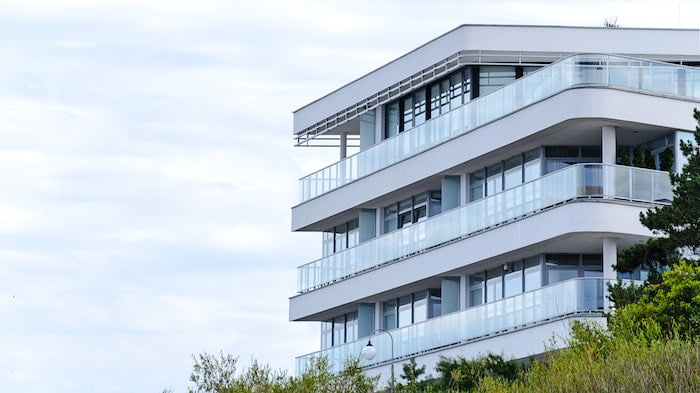
Outside picture of a drug and alcohol rehab in Dorset
Inpatient rehab treatment is a way to treat substance use disorders via an immersive treatment programme that tends to promote abstinence-based recovery.
Although some inpatient rehabs promote harm reduction [40], the majority of rehabs in Dorset require patients to get completely sober.
When you get inpatient treatment in Dorset, you enrol at a rehab facility that treats your substance addiction (most facilities treat all common addictions).
You commit to spending up to 28 days at the rehab centre, receiving treatments that may include therapy and a medically-assisted detox.
The rehab treatment programme is confidential; the details of your progress will not be passed on to your family, friends or employer without your consent.
This means you are free to be as open as you wish with the rehab treatment staff.
It is encouraged that the patient be vulnerable, particularly in therapy sessions, as relationships with rehab staff are proven to be a crucial part of inpatient rehab treatment. [41]
This is something that comes with time for most people, as you naturally get more comfortable as you learn to trust your therapists and other rehab medical professionals.
For guidance on attending inpatient drug and alcohol rehab in Dorset, give our team a call on 0800 088 66 86
What is outpatient drug and alcohol rehab in Dorset?

Therapist sat with a patient taking notes at a drug and alcohol rehab in Dorset
Outpatient rehab treatment comes in many different forms.
One common type is intensive outpatient programmes, which may have the same treatments as inpatient rehab, but without including accommodation.
For dual-diagnosis rehab patients (people with more than one mental health condition, including addiction), specialist groups are available that target all of their mental health issues. [42] This may be under one group (e.g., addiction and depression), or addressed in separate groups.
In general outpatient rehab treatment is recommended for those with mild addiction issues.
Think outpatient treatment might be right for you? Talk it over with our team on 0800 088 66 86
Can I go through rehab at home in Dorset or near Dorset?
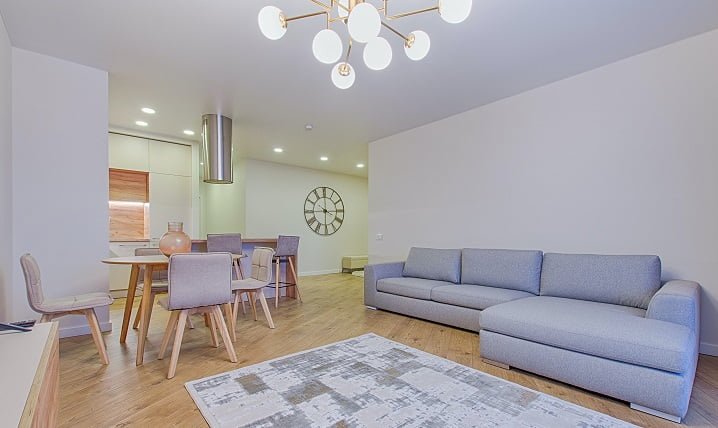
Living area in a residential drug and alcohol rehab clinic in Dorset
It can be overwhelming looking into the various rehab options available in Dorset and, because of this, it can be tempting to try to deal with it alone at home.
If your alcohol or drug addiction is relatively new and not severe, you may be able to safely detox at home instead of at rehab.
If you do decide to do this, it is a good idea to have a friend or relative stay with you to keep an eye on you in case you need medical help or rehab support.
However, if your condition is severe and has lasted for a long time, or if you drink more than 30 units of alcohol in a day, it can be dangerous to go through the detox stage without medical rehab intervention.
If you fall into any of the following categories, it is not recommended to go through detox at home and you should seek inpatient rehab treatment:
- You have co-occurring mental health issues, have suicidal thoughts, or if you are at risk of self-harming.
- You suffer from any mental or physical health condition that may be worsened by a home detox.
- You have made several attempts at maintaining sobriety but have failed each time.
- You have become violent while under the influence in the past.
- You have suffered from alcohol seizures or delirium tremens – or your addiction is so severe that delirium tremens is a possibility throughout your detox.
- You have been diagnosed with Wernicke’s encephalopathy [43].
To discover whether or not home detox in Dorset is the right choice for you, call us today on 0800 088 66 86
What are some alternatives to drug and alcohol rehab in Dorset?

Woman meditating on a bed at a residential drug and alcohol rehab in Dorset
Professionally supported drug and alcohol rehab is one of the best ways to recover from addiction, but it isn’t for everyone.
As previously stated, residential rehab or council-funded rehab is not for everyone.
If you have researched drug and alcohol rehab in Dorset and have decided that your addiction is not so severe that you need to avail of these services, there are alternatives that you could consider.
Some popular alternatives to inpatient rehab are:
- Alcoholics Anonymous [45] – Weekly meetings held in Dorset where people with an alcohol addiction can talk about their experience in a safe and non-judgmental environment.
- Narcotics Anonymous [46] – Similar to Alcoholics Anonymous, bu for people with drug addictions. Likewise, Cocaine Anonymous is a similar subgroup.
- SMART Recovery meetings [47] – Self-Management And Recovery Training – these meetings teach you that you are in control of your behaviour and have the power to change.
- Al-Anon Family Group Meetings – Meetings in Dorset for friends and family members affected by a loved one’s addiction.
- Outpatient rehab with drug and alcohol specialists – Visiting an outpatient facility in Dorset for scheduled appointments but continuing to detox and live at home.
What are self-help groups in Dorset or near Dorset?
Self-help groups are gatherings of people with similar issues (plus a therapist) that serve the purpose of bringing people together, offering support, and promoting accountability in the addiction recovery process.
Affiliation with these groups is linked to both short-term and long-term resistance to relapse.[48] Common examples include the aforementioned 12-Step Groups, Al-Anon and SMART Recovery.
Whatever help you need – whether from a conventional drug and alcohol rehab in Dorset, or from one of these excellent alternative treatment services- let our expert team help by calling us today on 0800 088 66 86
How do I organise a professional intervention for drug and alcohol rehab in Dorset?
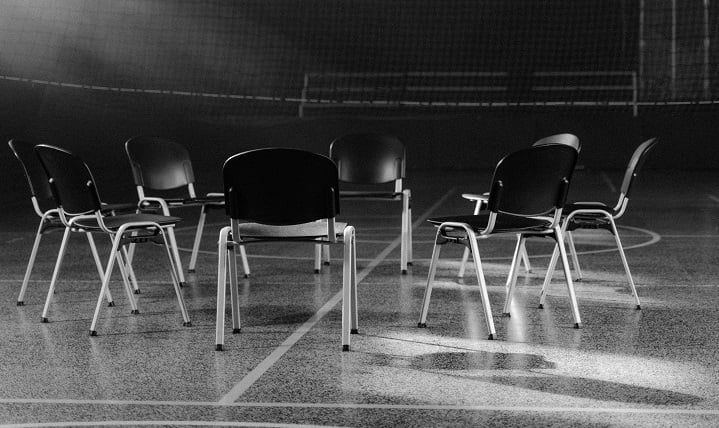
Empty chairs set up for a group therapy session at a drug and alcohol rehab in Dorset
Many people believe that in order for rehab to work, the person attending needs to go willingly. However, in many circumstances, people can enter rehab in Devon with some encouragement from friends and family and it will still work.
If you do decide to stage an intervention for someone you know that you think needs rehab support, there are different ways to approach this.
Usually, the first intervention is when close friends and family members gather together and confront the person about their addiction. They each take it in turns to talk about their concerns for the person struggling with an alcohol or drug addiction, how their addiction is affecting their life and why they think they need help or rehab.
This technique revolves around five distinct principles [53]; Ask, Advise, Assess, Assist, and Arrange.
In many cases, this is enough to make the person own up to their struggles and want to enter rehab treatment. However, there are times when a professional interventionist may be needed.
Community Reinforcement And Family Training [54], otherwise known as CRAFT, approaches interventions from a different angle. Instead of confronting someone about their addiction, CRAFT teaches friends and family members to think about the ways in which they may be unintentionally enabling the addiction.
As well as this, a professional interventionalist can teach families how and when to approach the idea of rehab with the substance user.
This is a less confrontational way to begin the journey towards sobriety at rehab and is often easier for the substance user to handle as they will not feel that they are being ganged upon.
Can someone force me to go to drug and alcohol rehab in Dorset or near Dorset?
No one can force you to go to drug and alcohol rehab in Dorset. What’s more, no one can make you go to a certain treatment centre.
There is plenty of choice when it comes to which rehab you attend – rehabs for specific ages, addictions and genders all exist to make sure patients are as comfortable as possible while they recover.
The treatments and facilities at each rehab are also different, so you can be more selective when finding the ideal location for you.
To make sure that your loved one gets the help they need from a drug and alcohol rehab in Dorset, call us today on 0800 088 66 86
How much does drug and alcohol rehab in Dorset cost?
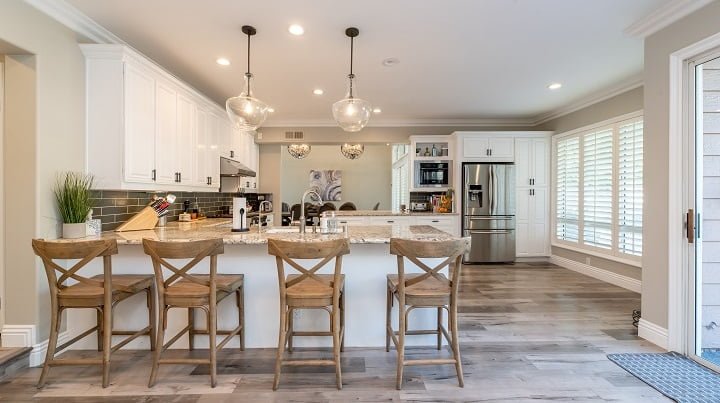
Kitchen at a residential drug and alcohol rehab centre in Dorset
The price of drug and alcohol rehab in Dorset varies depending on several factors, including the amount of time you need to spend in rehab, whether you are attending rehab as an inpatient or an outpatient, and the treatment centre you choose.
Attending a private rehab clinic in Dorset can cost between £8,000 and £12,000 if you are staying for 28 days in a private room.
This can be reduced to around £6,000 if you opt to share a room at rehab.
A 10-day detox in a private rehab clinic in Dorset can cost between £3,000 and £6,000. Again, if you wish to share a room, the price could drop to between £2,000 and £4,000.
Opting for a home detox instead of an in-person rehab detox reduces the price again, and you can expect to pay around £1,500 for this.
However, there is no way for us to give you an accurate price until we have spoken directly to you and set out a specific treatment rehab plan.
How can I afford to get sober at a rehab in Dorset?
Residential rehab is almost always private, so there is a cost involved. Most people manage to afford rehab by saving up or using their insurance (which can mean that the fees are reduced).
You do not need to have a huge budget to be able to afford addiction treatment – you can adapt your treatment plan to suit your financial situation by choosing a less expensive facility or going to rehab for a shorter period of time.
To learn how much your stay at a rehab in Dorset is likely to cost, call our expert team today on 0800 088 66 86
How do I choose the right drug and alcohol rehab in Dorset?

Therapist speaking with patients at a drug and alcohol rehab in Dorset
Choosing the right rehab clinic in Dorset can be quite a difficult and overwhelming task.
Addiction is not considered a ‘choice’ or ‘moral failing’ on behalf of the addiction sufferer – so the focus of rehab is always on returning agency to the patient.
There are lots of options to consider, including the type of care you’ll need and whether you want to opt for inpatient or outpatient rehab.
However, you should also consider the following when choosing a rehab:
- Does the rehab facility in Dorset have a long track record?
- Does the rehab facility in Dorset have good reviews?
- Does it have a high success rate?
- Is the treatment you need from the rehab facility in Dorset within your price range?
- Is the facility staffed with highly experienced nurses, doctors, and addiction specialists?
- Do you feel comfortable in the facility and around the staff?
Most rehab facilities in Dorset use a combination of talk therapies and alternative therapies.
It is important to understand exactly what the facility offers and if their approach to rehabilitation is the right fit for you.
To make sure that you end up at the perfect drug and alcohol rehab in Dorset for your needs, call us today on 0800 088 66 86
What is a detox, and do I need one at a drug and alcohol rehab in Dorset?

Photo of a garden in a drug and alcohol rehab clinic in Dorset
Simply put, alcohol or drug detox at rehab is the process of eliminating these substances from the body.
After prolonged use of drugs or alcohol, your body will build up a dependency on the substance. This means that you need more of the substance more often in order to feel the desired effect.
When you have a physical dependency, suddenly stopping the substance at rehab or at home can cause harmful mental and physical side-effects. These are known as withdrawal symptoms.
If it has been established that you have a physical addiction, undergoing an unsupervised drug or alcohol detox without rehab staff can be dangerous. This why quitting cold turkey is a very bad idea [55].
It is recommended to attend an inpatient rehab facility to go through the detox stage as this way you will have 24/7 support and direct access to medical professionals should you need it.
In severe cases, doctors at rehab may give you certain prescription drugs to counteract the drug or alcohol withdrawal symptoms with a view to reducing the dosage over time.
One example of this is the prescription drug Librium. It is a benzodiazepine that is often used to reduce the symptoms of anxiety – a common withdrawal symptom. You may also be prescribed Chlordiazepoxide for alcohol withdrawal syndrome during your detox in rehab. Continued abuse of alcohol can cause complications such as hepatitis and Wernicke-Korsakoff Syndrome [56].
Librium comes in doses of between 5mg and 25mg, and you will only need to take it for a week to 10 days at rehab to offset the anxiety.
Acamprosate [57], Naltrexone [58] and SSRIs [59] are also widely used during rehab addiction recovery.
Once your dosage has been reduced or stopped, you will be referred to a therapist at rehab or in your community who can help you tackle the psychological and mental effects of your addiction.
In an inpatient rehab setting, this will be done immediately, while you may have to wait longer if you decide to undergo rehab as an outpatient.
Make sure that your detox is safe and effective with the help of a rehab centre in Dorset – give our expert team a call today on 0800 088 66 86
Detoxing at drug and alcohol rehab in Dorset – What happens?
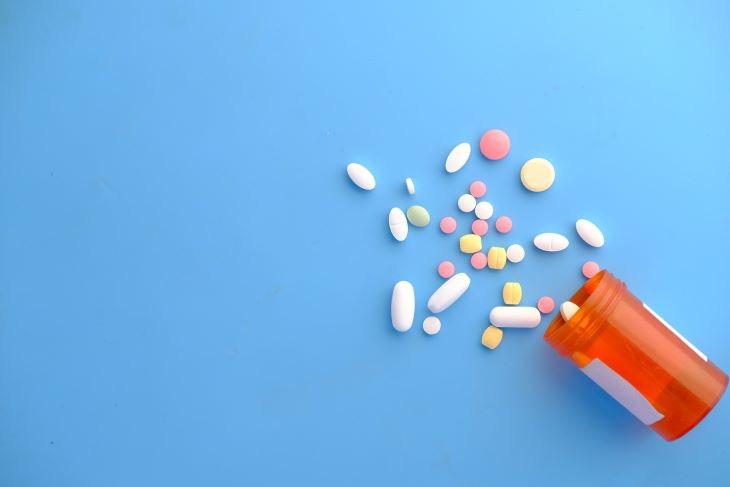
Various pills spilling out of a bottle
At drug and alcohol rehab in Dorset, there are facilities for medically-assisted detoxes (as well as non-medical detoxes). This is not just restricted to alcohol – many different drug detoxes take place at rehab in Dorset.
Rehab patients usually spend between 3-10 days detoxing from drugs and potentially taking medication to keep them healthy throughout the detox.
Some patients will start the rest of their rehab programme while they detox, whereas others (especially people with severe addiction) may need to wait until the detox is complete.
Medications that may be prescribed to treat cocaine dependence include propranolol, baclofen, tiagabine and topiramate [60].
Propranolol and substances like SSRIs are more likely to be used to keep anxiety levels down in the early stages [61], while the latter medications may be used as a form of relapse prevention after the patient has withdrawn from the drug at rehab.
To learn more about how a drug and alcohol rehab in Dorset will help facilitate a safe and effective detox, give our team a call on 0800 088 66 86
How long does rehab in Dorset last?

Therapy group talking together at a drug and alcohol rehab in Dorset
Every addiction is different, and different people will require different lengths of stay in a rehab facility in Dorset.
Whilst addiction itself can take anywhere from six months to five years [62] to recover from in a significant sense, rehab will not last nearly as long.
If addiction is relatively short-lived and not too severe, some people can opt for a 7–10-day detox. This way, they go through the worst and most dangerous stage of rehab with medical supervision.
Shorter stays in rehab often happen when the addiction does not cause a physical dependency, such as cannabis or cocaine.
If the substance you have been addicted to causes a physical dependency, such as alcohol or opioids, you will need a medical detox and a longer stay at rehab will be recommended.
In these cases, a 28-day rehab stay is common. This is because the physical addiction is treated first, and then the remainder of the time can be focussed on a full emotional and mental recovery.
For a more accurate prediction of how long your stay at a drug and alcohol rehab in Dorset is likely to last, give our team a call today on 0800 088 66 86
Will I be sober forever after drug and alcohol rehab in Dorset?

Two friends talking at a drug and alcohol rehab in Dorset
Though most people in recovery hope they will be sober forever, the reality is that relapse happens frequently when you leave rehab.
Even after a solid 28-day inpatient rehab programme, we cannot say that you will definitely never relapse.
Relapse statistics vary, but one study suggests they are 65-75% more likely to occur [63] in the 90 days after addiction rehab treatment.
Rehab in Dorset helps you to make the initial decision to get sober and provides you with guidance for remaining sober long-term.
If you manage your life well after rehab, and you get as much support as you can, there is a good chance that you will stay sober for good [64].
Give yourself the best chance to beat addiction once and for all at a drug and alcohol rehab in Dorset – call our expert team today on 0800 088 66 86
How can I access cocaine rehab in Dorset?

Couple walking together through the countryside during outdoor therapy at a drug and alcohol rehab in Dorset
Cocaine is a highly addictive drug that causes short bursts of energy in the user. Cocaine and crack cocaine are both so addictive that even one dose can lead to immediate addiction. Rehab is recommended.
Because the effects of cocaine are short-lived, users tend to take large quantities more often, thus creating a cocaine addiction.
In 2020, 777 deaths in England and Wales [65] were directly related to cocaine use, an increase of almost 10% from the year before.
Cocaine is not a physically addictive drug, which means that cocaine detox will not cause any physical withdrawal symptoms and medical support is not required. This usually means that a shorter stay in rehab is possible.
Overcome your cocaine addiction with the help of a drug rehab in Dorset – call our expert team today on 0800 088 66 86
How can I access heroin rehab in Dorset?

Support group raising their hands at sunset outside of a drug and alcohol rehab in Dorset
Heroin is a highly dangerous and highly addictive drug; it is also one of the most difficult drugs to detox from in rehab.
Heroin causes a psychological addiction as well as a physical addiction, meaning that a medical heroin detox will be required when you first enter rehab.
Often, methadone will be prescribed to counteract the withdrawal symptoms you may face at rehab, and the dosage will be reduced over time.
Heroin withdrawal can be dangerous, with side effects lasting weeks or months. Vomiting, diarrhoea, intense cravings, palpitations, and involuntary bodily movements are likely. That is why a medically-assisted detox in rehab is essential for heroin withdrawal.
In extreme cases, heroin withdrawal can cause heart attacks or strokes. Rehab staff will help to keep you safe.
Overcome your heroin addiction with the help of a drug rehab in Dorset – call our expert team today on 0800 088 66 86
How can I access cannabis rehab in Dorset?

People walking through the woods during outdoor therapy at a drug and alcohol rehab clinic in Dorset
Cannabis is a widely abused drug that many people use to counteract other health problems such as joint pain.
However, it is also highly addictive.
Cannabis is not a physically addictive drug, so you will not need a cannabis detox at rehab in order to stop taking it safely, however, you may have prolonged cravings for the drug.
If you decide to attend a rehab facility for an addiction to cannabis, you should expect to be there for 7 to 10 days.
We also offer rehab services for addictions such as:
- Behavioural Addictions
- Opioid Use Disorder
- Ketamine Addiction
- Gambling Addiction
- Cannabis Use Disorder
- Cocaine Dependence
- Buprenorphine Addiction
- Codependency
- Binge Drinking
Overcome your cannabis addiction with the help of a drug rehab centre in Dorset – call our expert team today on 0800 088 66 86
Therapy at drug and alcohol rehab in Dorset – What is available?

Therapist making notes during a group session at a drug and alcohol rehab centre in Dorset
Attending drug and alcohol rehab is a big decision, and it is important to know that you are getting the best possible rehab treatments while you are there.
Rehab facilities aim to treat physical and psychological aspects of addiction, as well as any underlying undiagnosed mental health issues that occur alongside addiction [66], such as depression, anxiety and post-traumatic stress disorder.
Each rehab facility will have its own program of treatments, ranging from traditional treatments like therapy, to holistic treatments such as yoga.
Before you start therapy, you will receive a treatment plan detailing all of the therapy sessions that you are going to have whilst at rehab in Dorset.
If you have another mental health condition as well as addiction, there may be a type of rehab therapy that would work well for both diagnoses.
For example, dialectical behaviour therapy (DBT) at rehab is effective at reducing BPD symptoms, as well as substance use disorder symptoms [67].
Some treatments that you are likely to encounter at one of the many rehab centres in Dorset are:
Cognitive Behavioural Therapy (CBT) at rehab in Dorset
CBT at rehab teaches you that your negative thoughts have negative consequences.
It teaches you ways to change the way you approach certain situations so that you can increase your chances of having positive experiences instead of negative ones. It can help to stop the cycle of negative thoughts and behaviours.
CBT has an extremely high success rate [68] compared to other rehab treatment programs, with those completing a full course of CBT being able to avoid relapse in most cases [69]. However, certain individuals may find that it is less effective, particularly those with learning disabilities or personality disorders [70].
Dialectical Behavioural Therapy (DBT) at rehab in Dorset
Dialectical Behavioural Therapy is similar to CBT in that it teaches positivity, however, it is geared towards people who struggle to manage their emotions. It most often occurs in group sessions at rehab.
Brief Interventions at rehab in Dorset
A brief intervention is a one-to-one session that tackles a specific issue. They usually don’t last very long but they encourage the service user to face a problem head-on until a solution is agreed upon.
Motivational Interviewing at rehab in Dorset
Motivation is a key aspect of any addiction rehab recovery journey, providing the drive and self-belief [71] needed to overcome addiction once and for all.
Motivational interviewing encourages the service user to find positive things within their own lives that are worth getting better for. People often feel empowered during these sessions, and positive emotions can be key in ensuring the individual follows through with a successful rehab recovery. [72]
Holistic Therapies at rehab in Dorset
Holistic therapies at rehab come in many forms and different facilities will offer different types of holistic therapy.
Common holistic therapies used in rehab facilities are art therapy, music therapy, meditation, mindfulness, acupuncture, yoga, nutritional counselling and more. These types of therapies are very calming and relaxing and can give the service user a healthy direction in which they can focus their anxieties.
Group Therapy at rehab in Dorset
Group therapy is popular in and out of rehab facilities, with many people attending community group therapy even after leaving rehab. The purpose of these sessions is to allow the person to understand that they are not alone in their struggle, they are not a failure, and they are not judged at these sessions.
Individual Therapy at rehab in Dorset
Individual therapy within a rehab setting is usually when co-occurring or underlying mental health issues are diagnosed and treated. As addiction often co-occurs alongside other issues, therapists will know exactly what signs to look for to make sure you are being fully treated.
This also ensures that you have a better chance at maintaining sobriety long after you leave rehab.
Co-dependency Treatment at rehab in Dorset
Co-dependency at rehab often affects the family members of drug and alcohol users as they find themselves neglecting their own needs in order to fulfil the needs of the user.
If the therapist believes that you are in a co-dependent relationship, they will help you discover what caused it and how to overcome the behaviour that enables it.
Twelve-Step Facilitation Therapy at rehab in Dorset
Twelve-step facilitation therapy finds a twelve-step program within the local area of the user and actively gets them involved once they leave rehab. This is based on the concept of a higher power.
Other types of therapy available at rehab includes:
- Eye Movement Desensitization and Reprocessing
- Group Psychotherapy
- Person-Centered Care
- Equine Therapy
- Drama Therapy
- Family Therapy
- Contingency Management
- Rational Emotive Behaviour Therapy
- Talking Therapies
- Acceptance and Commitment Therapy
When you get to rehab you will learn new coping mechanisms to help you face triggers when you leave.
Once you have left the rehab facility we can assist you in finding sober living houses if that is something you need.
Experience any and all of these excellent therapies at one of the many drug and alcohol rehab clinics in Dorset by calling us today on 0800 088 66 86
Does drug and alcohol rehab in Dorset provide aftercare?

Black and white photo of a support group hugging at a drug and alcohol rehab in Dorset
When you attend a drug and alcohol rehab clinic, you will be taught relapse prevention techniques to reduce your chances of relapsing in the future.
This is because rehab recovery is a lifelong process, as addiction can never really be cured [73] but can instead be managed for the rest of an individual’s life.
It is a common misconception that relapse prevention is put in place for when a user is struggling to cope, however, relapse prevention works better when good choices are made on a daily basis – becoming a routine for when you leave rehab.
To ensure that your addiction treatment at rehab in Dorset is matched by equally effective aftercare, call our team today on 0800 088 66 86
Frequently asked questions about drug and alcohol rehab in Dorset
Two people having a serious conversation at a drug and alcohol rehab centre in Dorset
What should I bring to inpatient drug and alcohol rehab in Dorset?
Each drug and alcohol rehab in Dorset will have a list of things you aren’t allowed to take to rehab, so there will be no confusion regarding what you need to pack
Most rehabs will also offer guidance in terms of what you should consider packing.
Some ideas are:
- Comfortable clothes
- Something to remind you of home/your family
- A journal or diary
- Books
- Mobile phone (if allowed)
- Toiletries
How will drug and alcohol rehab in Dorset impact my career?
Rehab doesn’t have to negatively impact your career in the long run. It does require you to take time off work, but it may well lead to better career prospects in the future.
Your chances of being a successful professional for the rest of your life while actively avoiding addiction rehab treatment are very low.
Get rehab treatment sooner, and reap the benefits faster.
We also advise you to keep this attitude as you progress through treatment. Employment is one of the main reasons people leave rehab early, and this is a tragedy in terms of relapse rates.
Most people don’t have to worry about losing their job to go to rehab in Dorset. If you’re unsure of how it would impact you, read your company policy or speak to Citizen’s Advice [75].
What happens on the last day of rehab in Dorset?
Hopefully, when the last day of rehab arrives you will feel confident managing your sobriety while still being able to lean on the rehab centre for support.
You will have plenty of time to plan for your last day, so it shouldn’t be high-stress.
For example, you will have made travel arrangements will be made before you enter rehab, so you don’t have to worry about getting home.
In the days leading up to your departure, you will develop an aftercare plan that tells you the specific ways you will benefit from the rehab’s support even from home.
Technological advancements are allowing rehab staff to craft solid aftercare plans that keep the risk of relapse lower than ever. One study even suggests [76] that app-based interventions could be used in the future for a reduced relapse risk and an improved quality of life.
Can my loved ones come to visit me at drug and alcohol rehab in Dorset?
Whether or not family and friends can visit you during treatment depends on your rehab’s policy.
Allowing family visits can make rehab patients feel more supported, boost morale, and improve family relationships.
However, it can also be distracting, and demoralising, and it can even be damaging for patients who don’t have guests.
Ultimately, whether or not your loved ones can visit you during rehab will depend entirely on that specific centre’s treatment practices and your own unique situation.
How can I refer myself to a drug and alcohol rehab in Dorset?

Patients taking notes at a drug and alcohol rehab in Dorset
To refer yourself to rehab in Dorset, you would need to choose a treatment centre and get in touch with them to find out about their referral system.
They will usually ask to speak to you over the phone before providing referral forms, but you can sometimes submit the forms immediately online.
Using a referral company, such as Rehab Recovery, means that you don’t have to learn how every single referral process works before deciding on the rehab you want to attend.
We are the experts, so all you need to do is tell us what type of rehab you want, and we will do the rest for you.
Get the help you need from your chosen drug and alcohol rehab in Dorset by giving us a call on 0800 088 66 86
Get professional help with rehab recovery

Person typing on a phone at a drug and alcohol rehab in Dorset
Please don’t try to manage your addiction on your own. Not only is it exhausting and painful, but it doesn’t work.
Going to drug and alcohol rehab in Dorset, on the other hand, is proven to work.
It keeps relapse rates low, and that’s exactly what you need when you’re battling a serious disease.
Decide to take back control of your life today by contacting Rehab Recovery today on 0800 088 66 86.
When you contact Rehab Recovery, all information you give us is held in the strictest of confidence.
We only refer your details to our Dorset rehab providers with your express permission. We truly look forward to hearing from you and helping you meet your recovery goals.
Every rehab in England and Wales that we work with is vetted by the Care Quality Commission. We also follow guidelines set by the
National Institute for Health and Care Excellence.
Get help for addiction across Dorset, including in Bournemouth, Poole, Weymouth, Christchurch, Ferndown, Dorchester, Wimborne Minster, Bridport, Gillingham, Lyme Regis, Verwood, Blandford Forum and many more.
References:
[1] https://www.cdc.gov/alcohol/onlinemedia/infographics/excessive-alcohol-use.html
[2] https://www.cdc.gov/alcohol/fact-sheets/alcohol-use.htm
[3] https://pubs.niaaa.nih.gov/publications/arh27-3/209-219.htm
[4] https://www.niaaa.nih.gov/publications/alcohol-and-brain-overview
[5] https://iv.iiarjournals.org/content/24/5/761
[6] https://www.niaaa.nih.gov/alcohols-effects-health/alcohols-effects-body
[7] https://www.ncbi.nlm.nih.gov/pmc/articles/PMC3321494
[10] https://www.mountsinai.org/health-library/selfcare-instructions/deciding-to-quit-drinking-alcohol
[11] https://www.bridportnews.co.uk/news/17598631.latest-number-crack-heroin-addicts-living-dorset/
[12] https://www.dorsetecho.co.uk/news/20622695.drug-deaths-dorset-reach-all-time-high/
[13] https://www.ncbi.nlm.nih.gov/pmc/articles/PMC4402015/
[14] https://pubmed.ncbi.nlm.nih.gov/10615733/
[15] https://www.publichealthdorset.org.uk/jsna/insights/alcohol-misuse-panel
[16] https://www.ncbi.nlm.nih.gov/pmc/articles/PMC4402015
[17] https://www.publichealthdorset.org.uk/-/drug-use
[18] https://nida.nih.gov/publications/drugfacts/understanding-drug-use-addiction
[19] https://ajp.psychiatryonline.org/doi/10.1176/appi.ajp.2018.17101174
[21] https://ajp.psychiatryonline.org/doi/10.1176/appi.ajp.2018.17101174
[23] https://medlineplus.gov/ency/article/001522.htm
[24] https://www.ihs.gov/asap/familyfriends/warningsignsdrug/
[25] Removed
[26] https://www.edu.gov.mb.ca/k12/cur/physhlth/frame_found_gr11/rm/module_e_lesson_2.pdf
[27 /28 ] https://www.ncbi.nlm.nih.gov/pmc/articles/PMC6876531
[30] https://www.ncbi.nlm.nih.gov/pmc/articles/PMC6241194
[31] https://pubs.niaaa.nih.gov/publications/arh26-2/90-98.htm
[32] https://www.health.harvard.edu/staying-healthy/12-ways-to-curb-your-drinking
[35] https://www.ncbi.nlm.nih.gov/pmc/articles/PMC3654310
[36] https://www.ncbi.nlm.nih.gov/pmc/articles/PMC3354400/
[37] https://www.ncbi.nlm.nih.gov/pmc/articles/PMC5328289
[39] https://www.nhs.uk/live-well/addiction-support/drug-addiction-getting-help/
[40] https://www.health.harvard.edu/staying-healthy/12-ways-to-curb-your-drinking
[41] https://www.nhs.uk/live-well/addiction-support/drug-addiction-getting-help/
[42] https://pubs.niaaa.nih.gov/publications/arh26-2/90-98.htm
[43] https://premierneurologycenter.com/blog/neurologic-diseases-associated-with-alcohol-consumption
[44] https://cdn.website-editor.net/30f11123991548a0af708722d458e476/files/uploaded/DSM%2520V.pdf
[46] https://meetings.ukna.org/meeting/Dorset
[47] https://uk.meetings.smartrecovery.org/meetings/?location=Dorset&coordinates=50
[48] https://www.ncbi.nlm.nih.gov/pmc/articles/PMC1852519/
[49] https://www.asam.org/asam-criteria/about-the-asam-criteria
[50] https://cdn.website-editor.net/30f11123991548a0af708722d458e476/files/uploaded/DSM%2520V.pdf
[52] https://www.mdcalc.com/calc/1729/cage-questions-alcohol-use
[53] https://www.ahrq.gov/prevention/guidelines/tobacco/5steps.html
[54] https://www.verywellmind.com/the-craft-approach-to-substance-abuse-intervention-5191125
[56] https://premierneurologycenter.com/blog/neurologic-diseases-associated-with-alcohol-consumption
[57] https://effectivehealthcare.ahrq.gov/products/alcohol-misuse-drug-therapy/consumer
[58] https://www.aafp.org/pubs/afp/issues/2016/0315/p457.html
[59] https://www.ncbi.nlm.nih.gov/pmc/articles/PMC5614930
[60] https://www.ncbi.nlm.nih.gov/pmc/articles/PMC2994240/
[61] https://agapetc.com/what-is-the-best-antidepressant-for-an-alcoholic
[62] https://www.racnj.com/the-five-stages-of-addiction-recovery
[63] https://www.ncbi.nlm.nih.gov/pmc/articles/PMC3674771/
[64] https://www.newdirectionsforwomen.org/what-percentage-of-alcoholics-recover/
[66/67] https://www.niaaa.nih.gov/publications/brochures-and-fact-sheets/understanding-alcohol-use-disorder
[68] https://gpsych.bmj.com/content/32/5/e100087
[69] https://pubmed.ncbi.nlm.nih.gov/32954958/
[70] https://www.ncbi.nlm.nih.gov/pmc/articles/PMC7001356
[72] https://www.ncbi.nlm.nih.gov/pmc/articles/PMC6760428
[73] https://nida.nih.gov/publications/drugs-brains-behavior-science-addiction/treatment-recovery
[74] https://drpeeke.com/2015/02/24/pillars-of-recovery-the-three-ms
[75] https://citizensadvicedorset.org.uk/
[76] https://www.sciencedirect.com/science/article/pii/S2214782922000240



